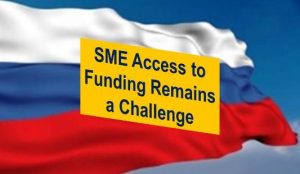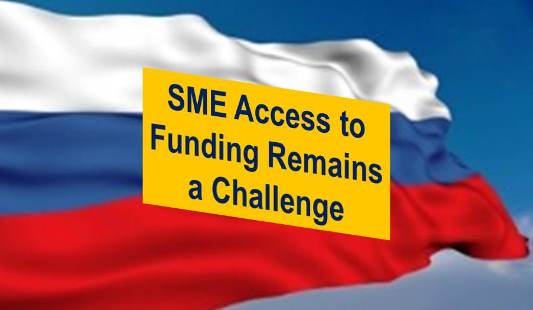 The lack of financial inclusion for sole entrepreneurs in Russia continues to be a challenge. Transparency is the key issue for banks to extend financing
The lack of financial inclusion for sole entrepreneurs in Russia continues to be a challenge. Transparency is the key issue for banks to extend financing
According to a report issued by the European Central Bank it is widely acknowledged that one of the weaknesses in the Russian financial sector is the lack of long-term financing. Such resources, especially in local currency, are not readily available to Russian banks, thus limiting the access that entrepreneurs have for long-term investment loans.
In the absence of long term financing sole entrepreneurs and larger SMEs resort to short term financing as a stop gap measure to satisfy their long term investment needs. This raises the risk for sole entrepreneurs and SMEs because of the mismatch of long term investment made in the business with the short term maturity of loans. They will expect banks to renew short term loans, however there is no guarantee that they will renew such loans.
For banks the rise in loans for sole entrepreneurs and SMEs leads to loan portfolios consisting of too many short-term loans. At the time of renewal banks will have to conduct the same risk assessment processes as the year before, which is labor intensive. During the renewal process the borrower will be given an opportunity to re-negotiate financing conditions, including the interest rate, which can be painful if margins are narrowing on the market. Even worse, it increases the risk of losing good clients to competitors.
Considering the above backdrop the funding of sole entrepreneurs in Russia remains weak, which retards economic development.
Number of loans is high, payment discipline is poor.
According to the data provided by the Joint Credit Bureau, one of the largest in Russia, only 10% of sole entrepreneurs are registered as borrowers. That represents a relatively small portion of the 3.8 million sole entrepreneurs currently registered in Russia (Source: Information and Analytical system Globas® as of July 2017). Each company received an average of 2.7 loans with a total debt US$30,000. Payment discipline of sole entrepreneurs appears to be poor: more than a quarter do not adhere to credit terms and 21% of loans are classified as being in default (over 90 days overdue).
Credit decision is negative. The current decline of loan approvals is typical not only for sole entrepreneurs, but for the SME community in general. According to the “Expert RA” agency, banks issued 3% less loans to SMEs in 2016 as compared to 2015.
Volatility of borrowers financial results as well as the difficulty of forecasting their future performance are the primary reasons for private banks to reject loan applications. Banks encounter further complications due to the lack of transparency. Many registered sole entrepreneurs do not perform a specific task, but simply act as ‘shadow’ companies in a chain of affiliated companies for the purpose of tax evasion.
Where there’s demand, there’s NO supply. A number of entrepreneurs solve the problem by applying for consumer loans (as an individual rather than a business). This is often easier and faster, but are only short term solutions and will not solve their long term financing needs. The state funding programm for SMEs (Program 6,5%), launched in 2015 by the Russian SME Development Corporation (https://www.biia.com/russian-risk-climate-state-financial-support-and-improving-information-transparency-will-facilitate-sme-access-to-favorable-funding, appears not to be an ideal soluiton. The number of loan applications placed by sole entrepreneurs increased by almost 1,5 times for 2016 but the number of approved credit decreased.
Transparency and commitment to adhere to credit terms needed:
Banks appear to be ready to change their attitude towards long-term lending as long as sole entreprenours and SMEs commit to adher to credit terms. This will apply not only in their dealings with banks, but also with suppliers and business partners. Sole entrepreneurs need to become transparent in terms of their business actitivities registered in public registers, providing financial statements prepared in a consistent and timely manner.
Due diligence when doing business with sole entrepreneurs is crucial not only for banks but also for all business community. An effective way to prevent the risks of cooperation with an unreliable business partner including also the SMEs is the use of such services as the Information and Analytical system Globas®,  https://globas.credinform.ru/en-GB/home/auth can assist in credit risk assessment of Russian counterparties including also from the SME sector.
https://globas.credinform.ru/en-GB/home/auth can assist in credit risk assessment of Russian counterparties including also from the SME sector.
Source: Credinform Russia






















